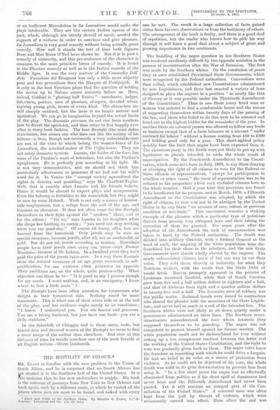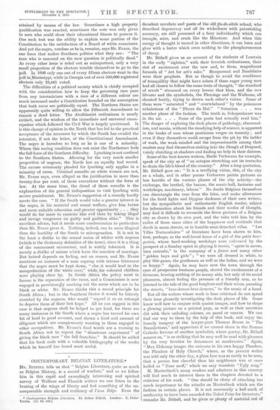THE HOSTILITY OF COLOUR"
Mu. EVANS is familiar with the race problem in the Union of South Africa, and he is surprised that no South African has Thisstudied it in the Southern half of the United States. It is fhis omission that ho has now undertaken to supply. His book is the outcome of journeys from New York to New Orleans and back again, each by a different route, in which he visited all the places, where men are most to be found, and talked with every * Mach and white to the Southern Mates. By Maude(' S. Evans, 14,mlon: Longman" and Co. [is, ad, net.'
one he met. The result is a large collection of facts gained either from his own observations or from the testimony of others. The arrangement of the book is faulty, and there is a good deal of repetition, but the reader who knows how to pick his way through it will learn a good deal about a subject of great and growing importance in two continents.
The handling of the negro question in the Southern States was rendered needlessly difficult by two opposite mistakes in the process of reconstruction after the War.of Sooession. The first was made by the Southern whites. On the conclusion of peace they at once established Provisional State Governments, which were recognized by the Federal authorities. Conventions were then called, which established new Constitutions administered by new Legislatures, and these last enacted a variety of laws designed to place the, aegroes in a position " as nearly like that of Slavery as it was possible under the Thirteenth Amendment of the Constitution." Thus in one State every freed man or woman was ordered to find a comfortable house and the means of supporting themselves within twenty days of the passing of the law, and those who failed to do this were to be arrested and hired out to the highest bidder for the remainder of the year. In another State no coloured person was allowed to follow any trade or business except that of a farm labourer or a servant " under contract for labour " without a licence costing from i10 to £100 and holding good only for a year. This short-sighted policy quickly bore the fruit that might have been expected from it. The victorious party in the North were not likely to put up with legislation so plainly intended to undo the whole result of emancipation. By the Fourteenth Amendment to the Consti- tution, which came into force in July, 1868, in any State denying or abridging the right of all citizens to vote for the Federal or State officials or representatives, " except for participation in rebellion or other crime," the basis of representation was to be reduced in the proportion which such excluded citizens bore to the whole number. Hall is year later this provision was found to be insufficient for its purpose, and in March, 1870, a Fifteenth Amendment to the Constitution was adopted, by which the right of citizens to vote was not to be abridged by the United States or by any State " on account of race, colour, or previous condition of servitude." This enactrilent remains a striking example of the pleasure which a particular typo of politician derives from passing very stringent laws and then taking the execution of thorn for granted. Per some years after the adoption of the Amendment the task of reconstruction was taken in hand by the Federal authorities. Tho South was divided into military districts, with a Federal General at the head of each, the majority of the white population Were dis- franchised for their share in the . rebellion, and the new State Governments were almost wholly elected by the nogroes. Tho newly enfranchised citizens knew of but one way to use their votes. They sold then], directly or indirectly, for what they Northern settlers, with the result that the State Debt of would fetch. Buyers promptly appeared in the persons of Louisiana increased fourfold, while that of South Carolina. grew from five and a half million dollars to eighteen and a half, and that of Alabama from eight and a quarter million dollars to twenty-five and a half. The favourite arca of robbery was the public works. Railroad bonds were issued to contractors who shared the plunder with the members of the State Legisla- ture, and never laid so much as a rail of the intended line. The Southern whites were not likely to sit down quietly under a government administered on these lines. The Northern recon- structionists misunderstood the race whose interests they supposed themselves to be guarding. The negro was not competent to protect himself against his former masters. The white population could not be disfranchised for ever without setting up a too conspicuous contrast between the letter and the working of the United States Constitution, and the right to vote was gradually given back to them. The negro voter knew the franchise as something with which he could drive a bargain. He had no belief in its value as a means of protection from violence. As he could not be deprived of his vote, the whole South was solid in its grim determination to prevent him from using it. " In a few short years the negro was as effectually eliminated from politics as if his short spell of dominance had never been and the Fifteenth Amendment had never been passed. Yet it still remains an integral part of tho Con- stitution of the United States." A coloured man was often kept from the poll by threats of violence, which were occasionally carried into effect. More often the end was attained by means of the law. Sometimes a high property qualification was exacted, sometimes the vote was only given to men who could show their educational fitness to possess it. One such test was the ability to explain some portion of the Constitution to the satisfaction of a Board of white examiners. And yet the negro, voteless as he is, remains, says Mr. Evans, the one force that makes Southern polities what they are : " The man who is unsound on the race question is politically dead." As every other issue is ruled out as unimportant, only a very small proportion of the electors trouble themselves to go to the poll. In 1006 only one out of every fifteen electors went to the poll inXississippi, while in Georgia out of over 500,000 registered electors only 33,441 voted.
The difficulties of a political society which is chiefly occupied with the consideration how to keep the governirig race pure from any intermixture with a race of a different colour are much increased under a Constitution founded on the assumption that both races are politically equal. The Northern States are apparently quite willing to 'allow the Fifteenth Amendment to remain a dead letter. The Abolitionist enthusiasm is nearly extinct, and the wisdom of the immediate and universal eman- cipation which followed the Civil War is largely questioned. It is this change of opinion in the North that has led to the practical eiceeptance of the measures by which the South has evaded the intention, if not the letter, of the Constitutional Amendment. The negro is harmless so long as he is one of a minority, Where this saving condition does not exist the Northerner feels the full force of the Southern difficulty. Lynching is not confined to the Southern States. Allowing for the very much smaller proportion of negroes, the North has an equally bad record. The excuse commonly pleaded for lynching only applies in a minority of cases. Criminal assaults on white women aro not, Mr. Evans says, even alleged as the justification in more than twenty-five per cent. of these executions without the form of law. At the same time, the dread of these assaults is the explanation of the general indisposition to visit lynching with severe punishment. Mr. Evans's suggestion of a remedy hardly meets the case. " If the South would take a-greater interest in the negro, in his material and moral welfare, give him better and more suitable education and greater opportunity . . . they would do far more to exorcise this evil than by • taking illegal and savage vengeance on guilty and guiltless alike." This is excellent advice, but it needs more condescension to particulars than Mr. Evans gives it. Nothing, indeed, can be more illogical than the hostility of the South to miscegenation. It is not in the least a dislike to the sexual union of whites with negroes (which is the dictionary definition of the term), since it is a thing of the commonest occurrence, and is widely tolerated. It is merely a dislike of unions which have the sanction of marriage. But hatred depends on feeling, not on reason, and Mr. Evans Mentions an instance of a. man arguing with intense bitterness that the negro must be kept down, " else it would lead to the mongrelization of the white race," while, his coloured children were playing close by. In South Africa the policy most in favour is the separation of the races, and 'a Commission is now engaged in provisionally marking out the areas which are to be black or white, Mr. Evans thinks this a sound principle for South Africa ; but in the Southerd States it would be bitterly reseated by the negrocs, who would " regard it es an attempt to deprive them of their last hope."' All ho can suggest in this case is that negroes shall be helped to get land, for there are many instances in the South where a negro has turned his own bit of land to good account, and shown a kind and amount of diligence which are conspicuously wanting in those engaged in other occupations. Mr. Evans's final words are a warning to South Africa not to repeat the " disastrous experiment " of giving the black race " the full franchise." It should be added that his book ends with a valuable bibliography of the works which he himself has found most useful.





















































 Previous page
Previous page